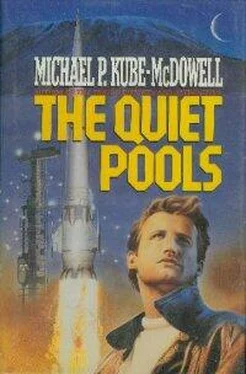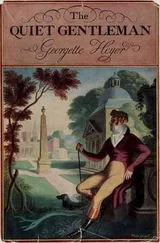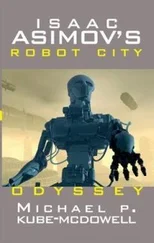“Funny,” said Meyfarth. “Loi once said that about you.”
Christopher looked up sharply. “Are you going to start that, too?”
“What?”
“Telling me I’m like my father. I’m not. I’ve told you that— we can hardly survive a weekend together.”
Meyfarth nodded in a way that somehow was an acknowledgment rather than agreement, pursed his lips, and considered. “Christopher, I see something here, but I’m not sure you do. Maybe it comes from sitting on this side of the room for so long—the patterns come to be familiar.”
“Patterns?”
Meyfarth nodded. “Families have a way of reinventing the same mistakes.”
“Spell it out, will you?”
“Lynn-Anne lost her mother, early. You lost your mother—”
“No. I told you, she—”
“You lost your mother early,” Meyfarth repeated. “I don’t care what semantic games you played in the family.” He paused. “Lynn-Anne blames your father for her mother going away. Do you blame him because yours did?”
“No.” The answer came quickly, emphatically. “ She left us. ”
“Broke her contract. Flew to Sanctuary and never came back.”
“Yes.”
“Do you hate her?”
Christopher shook his head slowly. “No.”
“Why not?”
Shakily, he drew a deep breath. “Her job was done, really. It was like saying good-bye to a good teacher. You don’t want to, but when it’s time—”
“A good teacher?”
“A very good one.”
“Did you love her?”
His eyes moistened. “Yes.”
Meyfarth waited, but Christopher did not fill the silence.
“This isn’t a good sign,” Meyfarth said finally, offering a compassionate smile. “We’re down to monosyllables.”
“Then ask better questions.”
There was a crackle in Christopher’s voice, something potent, something uncontained.
Meyfarth studied him levelly. “You said your father didn’t like to talk about Sharron. Does he talk about Deryn?”
“No.”
“What’s the last thing he said about her?”
A shake of the head. “I don’t remember.”
“The last thing you can remember, then.”
Christopher was squirming as though pinned to a dissection table. “He just doesn’t talk about her.”
“Anything.”
“He won’t talk about her when I do.” The words came out in a rush, a little ampoule of poison bursting.
“When did he talk about her?”
“I don’t know.”
“When she left? What did your father say when Deryn left?”
He shook his head again, frowning. “I don’t remember.”
“You don’t want to remember.” The words were a needle.
“I don’t want you to try to make me hate him.”
“You touched it a moment ago, didn’t you? When you said you loved your mother. Tell me what he said.”
Pleading. “I can’t remember.”
“Ask your fifteen-year-old self. He remembers.”
Suddenly, he was up out of his seat and shouting. “I don’t want to remember!”
“Then you don’t want to be well,” Meyfarth said calmly. “What did you say to him? When you knew she was going.”
Christopher’s eyes were seeing somewhere else. “I asked him to make her stay,” he whispered. “He said—”
“Yes?”
“Oh, God—”
Meyfarth’s voice turned hard. “You have to speak the truth about your own life, Christopher. If you don’t, the lies are going to own you forever.”
A shivery breath escaped Christopher’s lips. His face was knotted with pain.
“He said—” He swallowed and started again. “He said we were better off without her. She wants too much,” Christopher said, his voice rising. “He said, why should I try to stop her? I’ll be glad to say good-bye.” He blinked hard, squeezing out the tears that were welling in his eyes. “God damn him.”
Fists clenched, shivering, Christopher stood in the middle of the room, staring at the blank white wall on which he seemed to see his life. But it was not until Meyfarth rose from his chair and wrapped him in a quieting hug that Christopher began to cry in earnest, and let himself feel at last the pain of a crippling cut which had never healed.
Christopher drove back to the center dazed and benumbed, the flyer’s radio merely noise in his ears.
“Top news of the hour: from Diaspora Project headquarters in Prainha, Brazil, word that the certification flight of the star-ship Memphis will be delayed at least a month. The shakedown mission, a round-trip sprint to the orbit of Pluto, had been scheduled to begin February 5. Although Project officials would not comment, simple math indicates that the ship’s announced sailing date of April 1 is also in peril.
“The announcement came from Takara construction crew chief Benjamin Burns, who had this to say: ‘You have to remember that Memphis is a different ship than Ur was—a third bigger, more complex, with hundreds of modifications to every major ship system. So even the old hands up here are really doing this for the first time. And it has to be right the first time, so we’re not going to let ourselves be rushed by an artificial schedule.’
“Burns announced no firm date for the test flight and refused to give specific details about the reason for the delay. But Anne-Lee Adams, a space system analyst with Grodin Associates, pointed to claims made last week by Homeworld spokesperson Jeremiah:
“ ‘In my view, this confirms the rumors and reports of a major sabotage incident at Allied Transcon’s Munich center. For them to acknowledge it at all means that the damage must have been quite serious. I expect we’ll see this one-month postponement turn into a much longer delay before the story has run its course.’ ”
The news barely penetrated Christopher’s consciousness and distracted him not at all from his thoughts. Though Meyfarth had mercifully found an extra forty minutes to spend with him, that time had bought him only a measure of composure, carried him only a tiny step toward peace. The walls of denial were still toppling, and his eyes hurt from the light that was shining in.
He could see all the way back, all the way in. He could no more close his eyes to it than he could stop breathing, though both had their temptations. There was nothing soft beneath him to catch him when he fell. There was nothing firm enough to carry the weight of his life.
Tear apart the memories and assemble them anew, all the sharp edges restored, the polish removed. Too many pieces to hold at once. Too many connections to make between them.
I thought I was a happy kid. I thought I’d come through pretty clean—
Truth was a solvent for illusion, but there was nothing tidy about the process, nothing cheap about the price. He had bought a dose of truth that morning and paid for it with the rawness of his throat and the battered ache in his body.
And the hardest truth was that it was not over.
It was not just the work ahead—sorting untouched feelings, touching disowned thoughts, assembling all the pieces into the picture he had so long rejected. It was the knowledge that all of that work would only solve half of the equation. For the other half, he would have to look to William McCutcheon.
“It’s a hard choice, confronting a parent,” Meyfarth had told him. “You have to risk losing the relationship that you have in order to get a better one. And that’s difficult for some people to do. Unsatisfactory as that relationship might be, your definitions of love and self and family are all tied up with it. You’re going to need some support from outside and some strength from inside. Don’t force a showdown now. Give yourself time.”
Читать дальше

![Nick Cracknell - The Quiet Apocalypse [= Island Zero]](/books/28041/nick-cracknell-the-quiet-apocalypse-island-zero-thumb.webp)










